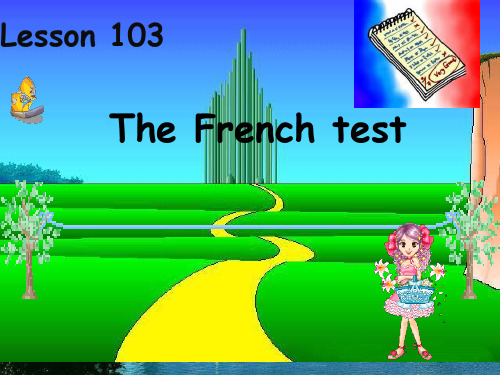新概念英语第一册第103课(共56张)
- 格式:pdf
- 大小:15.32 MB
- 文档页数:56






Lesson 103-104 The French test1.How was the exam? =How did the exam go?2.Not too bad. Just so so. Pretty good.3.I think I passed in English and Mathematics.Pass 及格fail 不及格(通过某一考试用pass 而通过某一考试科目用pass in) eg.Pass the mid-term exam .4.How about you ? =What about you?〔用于提建议〕eg.How about having a rest?5.The English and Maths papers were not easy enough for me.Paper 纸张(不可数) a piece of paperPapers 试卷,论文〔可数〕the english papersEnough 足够地,副词,修饰形容词,用在形容词之后easy enough足够的,形容词,修饰名词,用在名词之前enough books/moneyFor 对...来说eg.The house is big enough for us.6.I could answer sixteen of the questions.Could 是can的过去式,后加动词原形,否认式加not eg.Tow of the students 7.They were too difficult for me. (注意区分difficult /different)Too 也;太,过于. eg.I like English,he likes English,too.eg.The pair of shoes are too small for me.Too...to... 太...而不能... Eg.He is too young to go to school.8.I am sure I have got a low mark.(宾语从句)Low mark 低分high mark 高分考试考得好/不好I have done well/badly.9.Cheer up! Come on! Open up! 加油鼓励10.The guy next to me wrote his name at the top of the paper. Next to=beside 在...旁边at the top of... 在...顶端,在...上方At the bottom of... 在...下方,在...末端11.Then he sat there and looked at it for three hours!For +时间段:持续了多长时间eg.I have lived here for ten years.Summary1.情态动词的过去式Can-could 不因人称和数的变化而变化Eg1.I can answer the questions.I could answer the questions.Eg2.Could you answer the questions?Yes,I could./No,I could not.Eg3.He can not answer the questions.He could not answer the questions.Eg4.Could he answer the questions?Yes,he could./No,he could not.2.Too太Very非常Enough足够〔1〕too和very通常放在所修饰的形容词之前,而enough要放在所修饰形容词之后。
新概念第一册103课课文原文摘要:I.引言- 介绍新概念第一册103 课课文原文II.课文概述- 原文内容概述III.课文翻译- 逐句翻译课文IV.课文重点解析- 解析课文的重点难点V.结论- 总结课文内容正文:I.引言新概念第一册103 课课文原文是一篇经典的英语文章,通过简单的语言和生动的例子,向读者介绍了如何表达自己的观点和询问对方的意愿。
本文将详细介绍这篇文章,包括课文概述、翻译和重点解析。
II.课文概述这篇课文的原文主要讲述了一个人在向另一个人提出建议或请求时,应该注意使用正确的语言表达。
文章通过举例,详细介绍了“must”和“can”的用法,以及如何用“may”表达请求。
III.课文翻译以下是新概念第一册103 课课文原文的翻译:A: Can you come to my party on Saturday?B: I"d love to, but I"m afraid I must wash my hair that day.A: May I borrow your bike?B: Yes, of course, you may.A: Must I finish my homework now?B: Yes, you must.IV.课文重点解析在这篇课文中,作者通过四个例句,介绍了“must”、“can”和“may”的用法。
在第一个例句中,B 用“must”表示自己无法参加派对,因为那天他必须洗头发。
这里的“must”表示一种必须遵守的规定或约定。
在第二个例句中,A 用“may”请求借用B 的自行车,B 用“yes, of course, you may”表示同意。
这里的“may”表示允许或请求。
在第三个例句中,A 用“must”询问是否必须完成作业,B 用“yes, you must”表示肯定。
这里的“must”表示必须遵守的规定或命令。
在第四个例句中,B 用“can”表示自己无法参加派对,因为那天他必须洗头发。